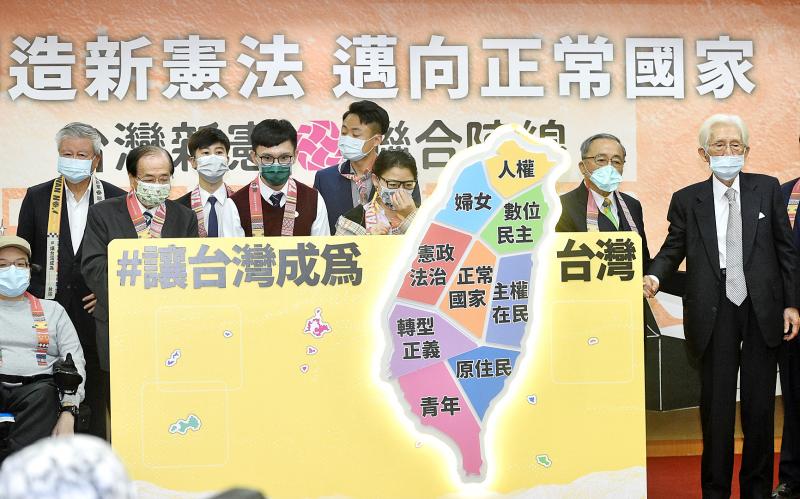Independence advocates yesterday launched the Taiwan New Constitution Alliance to promote drafting a new, localized constitution.
“This is a historic moment for Taiwan. Drafting a new constitution is the most important task Taiwanese face,” veteran independence advocate Koo Kwang-ming (辜寬敏) said at the inaugural event in Taipei.
“Although the Democratic Progressive Party is in power, its authority is based on the Republic of China [ROC] Constitution, which has no connection to Taiwan,” said the 95-year-old Koo, a former presidential adviser.

Photo: George Tsorng, Taipei Times
“The historic task of drafting a new constitution depends on efforts by all Taiwanese,” Koo said. “A constitution for a sovereign, independent Taiwan is not just for the benefit of those of us alive today, but also for that of our children and grandchildren.”
“The ROC Constitution was drafted in and for China, by representatives of the Chinese Nationalist Party [KMT],” said Lee Hung-hsi (李鴻禧), constitutional expert and law professor at National Taiwan University, adding that a new constitution for Taiwan should have been drafted much earlier.
Representatives of the Taiwan New Constitution Foundation, which is chaired by Koo, read out a proclamation on the need for a new constitution, saying: “When provisions in the ROC Constitution are in conflict with the wishes of Taiwanese and their pursuit of happiness, people have the right to a new constitution.”
The ROC Constitution was ratified during a National Constituent Assembly meeting in Nanjing, China, in 1946, they said.
“Taiwanese were not involved in the process of drafting or ratifying it, and were never asked for consent,” they said. “It was imposed on Taiwan, but later was suspended as the KMT placed the nation under martial law.”
“In the decades before Taiwan’s democratization started in the 1990s, Taiwanese were not granted the rights stipulated in the Constitution, such as the freedoms of expression, assembly and the press,” they said.
“Taiwanese only had a minimal say at the local level, while Mainlanders held all relevant positions in the central government, including as lawmakers who were not elected by the public,” they added.
“The ROC Constitution is dead and exists in name only. As the constitution of China, it has been superseded by the People’s Republic of China constitution,” they said.
A new constitution would omit the obsolete provisions in place and better represent the reality of two separate entities on both sides of the Taiwan Strait, they said.
“A new constitution would do away with the myth of a unification with China,” they said. “It would be an expression of the Taiwanese public’s will for self-determination and safeguard their dignity.”

Taiwan has received more than US$70 million in royalties as of the end of last year from developing the F-16V jet as countries worldwide purchase or upgrade to this popular model, government and military officials said on Saturday. Taiwan funded the development of the F-16V jet and ended up the sole investor as other countries withdrew from the program. Now the F-16V is increasingly popular and countries must pay Taiwan a percentage in royalties when they purchase new F-16V aircraft or upgrade older F-16 models. The next five years are expected to be the peak for these royalties, with Taiwan potentially earning

STAY IN YOUR LANE: As the US and Israel attack Iran, the ministry has warned China not to overstep by including Taiwanese citizens in its evacuation orders The Ministry of Foreign Affairs (MOFA) yesterday rebuked a statement by China’s embassy in Israel that it would evacuate Taiwanese holders of Chinese travel documents from Israel amid the latter’s escalating conflict with Iran. Tensions have risen across the Middle East in the wake of US and Israeli airstrikes on Iran beginning Saturday. China subsequently issued an evacuation notice for its citizens. In a news release, the Chinese embassy in Israel said holders of “Taiwan compatriot permits (台胞證)” issued to Taiwanese nationals by Chinese authorities for travel to China — could register for evacuation to Egypt. In Taipei, the ministry yesterday said Taiwan

‘LIKE-MINDED PARTNER’: Tako van Popta said it would be inappropriate to delay signing the deal with Taiwan because of China, adding he would promote the issue Canadian senators have stressed Taiwan’s importance for international trade and expressed enthusiasm for ensuring the Taiwan-Canada trade cooperation framework agreement is implemented this year. Representative to Canada Harry Tseng (曾厚仁) in an interview with the Central News Agency (CNA) said he was increasingly uneasy about Ottawa’s delays in signing the agreement, especially as Ottawa has warmed toward Beijing. There are “no negotiations left. Not only [is it] initialed, we have three versions of the text ready: English, French and Mandarin,” Tseng said. “That tells you how close we are to the final signature.” Tseng said that he hoped Canadian Prime Minister Mark Carney

POSITIVE DEVELOPMENT: Japan and the US are expected to hold in-depth discussions on Taiwan-related issues during the meeting next month, Japanese sources said The holding of a Japan-US leaders’ meeting ahead of US President Donald Trump’s visit to China is positive news for Taiwan, former Japan-Taiwan Exchange Association representative Hiroyasu Izumi said yesterday. After the Liberal Democratic Party’s landslide victory in Japan’s House of Representatives election, Japanese Prime Minister Sanae Takaichi is scheduled to visit the US next month, where she is to meet with Trump ahead of the US president’s planned visit to China from March 31 to April 2 for a meeting with Chinese President Xi Jinping (習近平). Japan and the US are expected to hold in-depth discussions on Taiwan-related issues during the